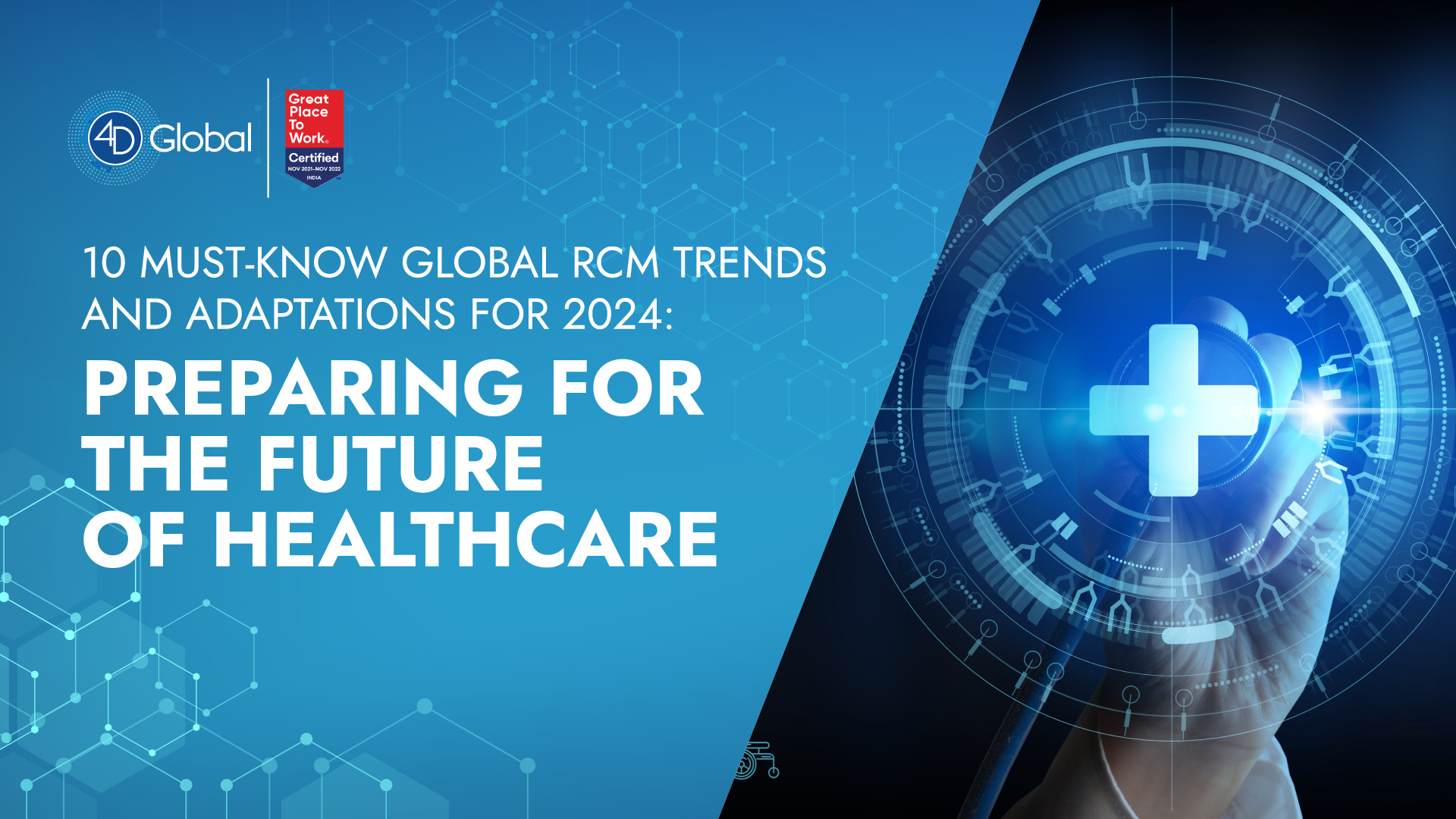
As we continue through 2024, Revenue Cycle Management (RCM) stands at the forefront of innovation and efficiency in the healthcare sector. This year will continue to witness pivotal shifts in RCM, driven by technological advancements, regulatory changes, and evolving patient expectations. These transformations offer healthcare providers a unique opportunity to enhance financial operations while elevating patient care. In this blog, we delve into the key RCM trends that are reshaping healthcare, providing insights and strategies for organizations to navigate this dynamic terrain and harness the potential of these emerging developments.
Here are Global RCM Trends and Adaptations for 2024 to Position your Healthcare Practice at the Forefront of Efficiency, Innovation, and Patient Satisfaction.
- Emerging Labor Dynamics in RCM- According to Becker’s Hospital Review, over 60% of hybrid RCM workers are considering exits. As a result, the shift toward outsourcing and technological integration such as AI automation is becoming more pronounced. These trends not only address staffing shortages but also enhance operational efficiencies, allowing healthcare organizations to focus on core competencies and patient care.
- AI Integration Transforming RCM- With 60% of healthcare providers eyeing investments in generative AI, the impact on RCM processes is profound. From automating claims coding to enhancing patient engagement with AI-driven tools, these advancements are streamlining operations, improving accuracy, optimizing denial management, and reshaping patient interactions for the better.
- Technological Advancements in Prior Authorization- The move toward electronic prior authorization is gaining momentum, significantly reducing transaction costs and improving efficiency. New regulations are set to streamline this process further, offering a more transparent and seamless experience for patients and providers alike.
- Innovative Payment Models on the Rise- The adoption of value-based care is influencing RCM, necessitating closer collaboration with clinical departments to align financial processes with patient outcomes. The emphasis is on real-time data verification and enhancing patient financial engagement through transparent and flexible payment solutions.
- The Patient’s Financial Experience—With a shift toward high-deductible health plans, the focus on patient payments is intensifying. Providers are adopting digital billing solutions and convenient payment methods, reflecting a broader trend toward consumer-centric financial interactions in healthcare. These solutions streamline the payment process, offering payment plans and flexible options that alleviate patients’ financial strain while concurrently enhancing providers’ revenue generation.
- Automation as a Core Requirement- Automation in RCM is evolving from a trend to a necessity. A significant focus is on streamlining tasks from patient scheduling to claims processing. The adoption of automation technologies is becoming increasingly important to efficiently handle the growing influx of patients and to navigate the complexities associated with contemporary billing practices. By automating routine and time-consuming tasks, healthcare providers can ensure greater accuracy, reduce administrative burdens, and focus more on delivering quality patient care.
- Data Analytics in Mergers and Acquisitions- In the healthcare sector, where mergers and acquisitions are becoming increasingly common, data analytics plays a crucial role. It helps provide a clear and comprehensive perspective on the financial performance of the combined entities. This insight is vital for making informed strategic decisions and for ensuring that the integration of different systems and processes across the merging organizations is smooth and efficient.
- Advances in Denial Management- AI is playing a crucial role in transforming denial management by enabling predictive analytics and one-touch denial correction, significantly reducing the burden of denied claims and enhancing revenue recovery.
- Outpatient Procedures Growth in ASCs- The rise in outpatient procedures at Ambulatory Surgery Centers (ASCs) underscores the need for refined RCM strategies to handle the increasing variety and volume of services and ensure accurate reimbursement and compliance.
- Staffing Challenges and Solutions- Despite technological advancements, RCM staffing challenges persist. Embracing innovative staffing models and leveraging AI-driven solutions can alleviate some of these issues, allowing staff to concentrate on higher-value tasks.
Empower Your Healthcare Practice with 4D Global’s Advanced RCM Solutions.
As we navigate the global RCM trends and adaptations for 2024, healthcare practices have an essential opportunity to evolve with the times, enhancing operational efficiency, financial robustness, and patient care quality. 4D Global makes a significant impact for our clients towards these outcomes, providing state-of-the-art RCM solutions that align with these emerging trends.
By partnering with 4D Global, your practice gains access to innovative strategies and technologies, empowering you to excel in this new era of healthcare management and set a benchmark in delivering superior patient experiences—achieving financial excellence.
Contact us today for a complimentary discovery call, and we’ll show you how we can transform your RCM outcomes, achieve maximum profitability and efficiency, and elevate patient care within your practice.
